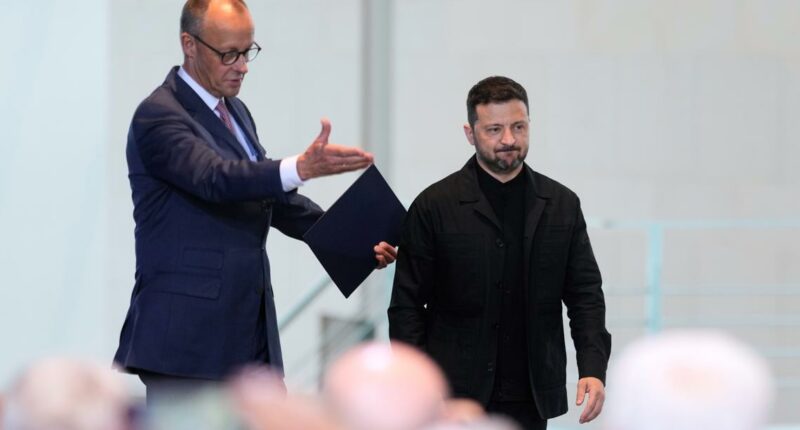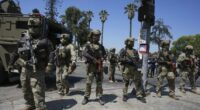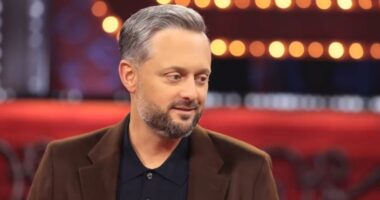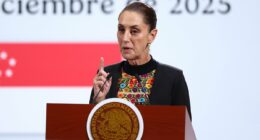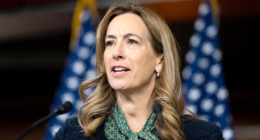Share this @internewscast.com
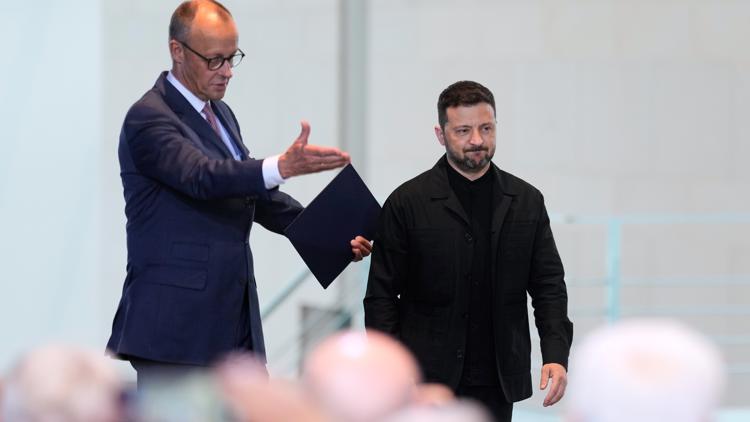
Ahead of the summit, Zelenskyy said there was “currently no sign that the Russians are preparing to end the war.”
BERLIN, Germany — On Wednesday, Ukrainian President Volodymyr Zelenskyy is meeting with German Chancellor Friedrich Merz in Berlin to engage in discussions with European and U.S. leaders before the anticipated Trump-Putin summit, according to the German government.
Merz has organized a series of virtual discussions for Wednesday, aiming to amplify the perspectives of European and Ukrainian leaders before the summit in Alaska. This is where President Donald Trump and Russian President Vladimir Putin are slated to talk about strategies for ending Russia’s conflict in Ukraine.
Zelenskyy and the leaders of European countries have all been sidelined from that summit.
Zelenskyy is expected to confer with European leaders first, gearing up for a virtual dialogue with Trump and Vice President JD Vance around an hour later. The day will conclude with a conversation among leaders of nations forming the “coalition of the willing,” those committed to supporting any forthcoming peace deal between Moscow and Kyiv.
During Zelenskyy’s previous trip to Berlin in late May, Merz promised to assist Ukraine in developing its own long-range missile technology that would operate without Western-imposed usage restrictions.
On Wednesday, Zelenskyy stated that his administration has conducted over 30 discussions with allies in advance of the Alaska summit, yet he remains skeptical about Putin’s willingness to participate in sincere negotiations.
In a message on his official Telegram channel, Zelenskyy expressed that there was “currently no indication that the Russians are ready to end the war,” and he called on Ukraine’s partners in the U.S. and Europe to work together to “compel Russia towards peace.”
“Pressure must be applied on Russia for an honest peace. We must take the experience of Ukraine and our partners to prevent deception by Russia,” Zelenskyy said.
Trump has said he wants to see whether Putin is serious about ending the war, now in its fourth year, describing Friday’s summit as “a feel-out meeting” where he can assess the Russian leader’s intentions.
Yet Trump has disappointed allies in Europe by saying Ukraine will have to give up some Russian-held territory. He has also said Russia must accept land swaps, although it was unclear what Putin might be expected to surrender.
European allies have pushed for Ukraine’s involvement in any peace talks, fearful that discussions that exclude Kyiv could otherwise favor Moscow.
Trump on Monday ducked repeated chances to say that he would push for Zelenskyy to take part in his discussions with Putin, and was dismissive of Zelenskyy and his need to be part of an effort to seek peace. Trump said that following Friday’s summit, a meeting between the Russian and Ukrainian leaders could be arranged, or that it could also be a meeting with “Putin and Zelenskyy and me.”
The Europeans and Ukraine are wary that Putin, who has waged the biggest land war in Europe since 1945 and used Russia’s energy might to try to intimidate the European Union, might secure favorable concessions and set the outlines of a peace deal without them.
The overarching fear of many European countries is that Putin will set his sights on one of them next if he wins in Ukraine.
Zelenskyy said Tuesday that Putin wants Ukraine to withdraw from the remaining 30% of the Donetsk region that it still controls as part of a ceasefire deal, a proposal the leader categorically rejected.
Zelenskyy reiterated that Ukraine would not give up any territory it controls, saying that would be unconstitutional and would serve only as a springboard for a future Russian invasion.
He said diplomatic discussions led by the U.S. focusing on ending the war have not addressed key Ukrainian demands, including security guarantees to prevent future Russian aggression and including Europe in negotiations.
Three weeks after Trump returned to office, his administration took the leverage of Ukraine’s NATO membership off the table — something that Putin has demanded — and signaled that the EU and Ukraine must handle security in Europe now while America focuses its attention elsewhere.
Senior EU officials believe that Trump may be satisfied with simply securing a ceasefire in Ukraine, and is probably more interested in broader U.S. geostrategic interests and great power politics, aiming to ramp up business with Russia and rehabilitate Putin.
Russian forces on the ground in Ukraine have been closing in on a key territorial grab around the city of Pokrovsk, in the eastern Donbas region which is part of Ukraine’s eastern industrial heartland that Putin has long coveted.
Military analysts using open-source information to monitor the battles have said Ukraine’s ability to fend off those advances could be critical: Losing Pokrovsk would hand Russia an important victory ahead of the summit and could complicate Ukrainian supply lines to the Donetsk region, where the Kremlin has focused the bulk of military efforts.
Meanwhile, Ukrainian forces struck an oil pumping station in Russia’s Bryansk region overnight on Wednesday, according to a statement from Ukraine’s General Staff.
Ukrainian drones struck the Unecha station which supplies the Russian army, the statement said, adding that damage and a large fire was reported in the area around the pumping station.
Unecha transports oil to two pipelines with an annual capacity to pump 60 million tons. The operation was carried out by units of the Unmanned Systems Forces of Ukraine’s army and the Main Intelligence Directorate of the Defense Ministry, the statement said.
Cook reported from Brussels. Associated Press writer Samya Kullab in Kyiv, Ukraine contributed.
Copyright 2025 Associated Press. All rights reserved. This material may not be published, broadcast, rewritten, or redistributed.
